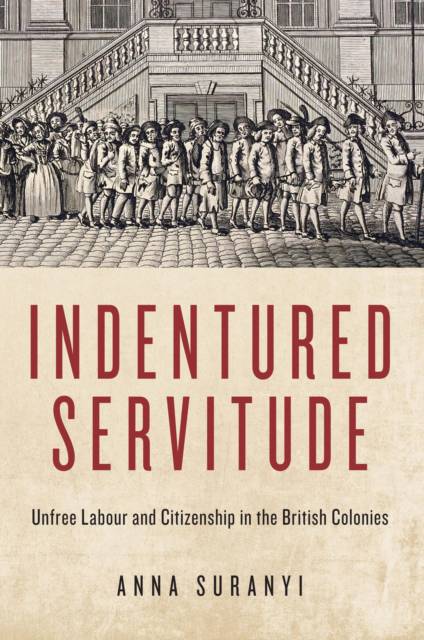
Je cadeautjes zeker op tijd in huis hebben voor de feestdagen? Kom langs in onze winkels en vind het perfecte geschenk!
- Afhalen na 1 uur in een winkel met voorraad
- Gratis thuislevering in België vanaf € 30
- Ruim aanbod met 7 miljoen producten
Je cadeautjes zeker op tijd in huis hebben voor de feestdagen? Kom langs in onze winkels en vind het perfecte geschenk!
- Afhalen na 1 uur in een winkel met voorraad
- Gratis thuislevering in België vanaf € 30
- Ruim aanbod met 7 miljoen producten
Zoeken
€ 51,95
+ 103 punten
Uitvoering
Omschrijving
Hundreds of thousands of British and Irish men, women, and children crossed the Atlantic during the seventeenth century as indentured servants. Many had agreed to serve for four years, but large numbers had been trafficked or "spirited away" or were sent forcibly by government agencies as criminals, political rebels, or destitute vagrants.In Indentured Servitude Anna Suranyi provides new insight into the lives of these people. The British government, Suranyi argues, profited by supplying labour for the colonies, removing unwanted populations, and reducing incarceration costs within Britain. In addition, it was believed that indigents, especially destitute children, benefited morally from being placed in indenture. Capitalist entrepreneurs who were influential at the highest levels of government made their fortunes from Atlantic trade in goods, indentured servants, and slaves, and their participation in the servant trade contributed to the commercialization of criminal justice. Suranyi breaks new ground in showing how indentured servitude was challenged: once in the colonies, indentured servants adapted resourcefully to their circumstances and rebelled against unfair conditions and abuse by suing their masters, by running away, or through outright revolt.Emerging ideas about race and citizenship led to vehement public debate about the conditions of indentured servants and the ethics of indenture itself, prompting legislation that aimed to curb the worst excesses while slavery continued to expand unchecked.
Specificaties
Betrokkenen
- Auteur(s):
- Uitgeverij:
Inhoud
- Aantal bladzijden:
- 288
- Taal:
- Engels
- Reeks:
Eigenschappen
- Productcode (EAN):
- 9780228006688
- Verschijningsdatum:
- 1/07/2021
- Uitvoering:
- Paperback
- Formaat:
- Trade paperback (VS)
- Afmetingen:
- 150 mm x 226 mm
- Gewicht:
- 453 g

Alleen bij Standaard Boekhandel
+ 103 punten op je klantenkaart van Standaard Boekhandel
Beoordelingen
We publiceren alleen reviews die voldoen aan de voorwaarden voor reviews. Bekijk onze voorwaarden voor reviews.









